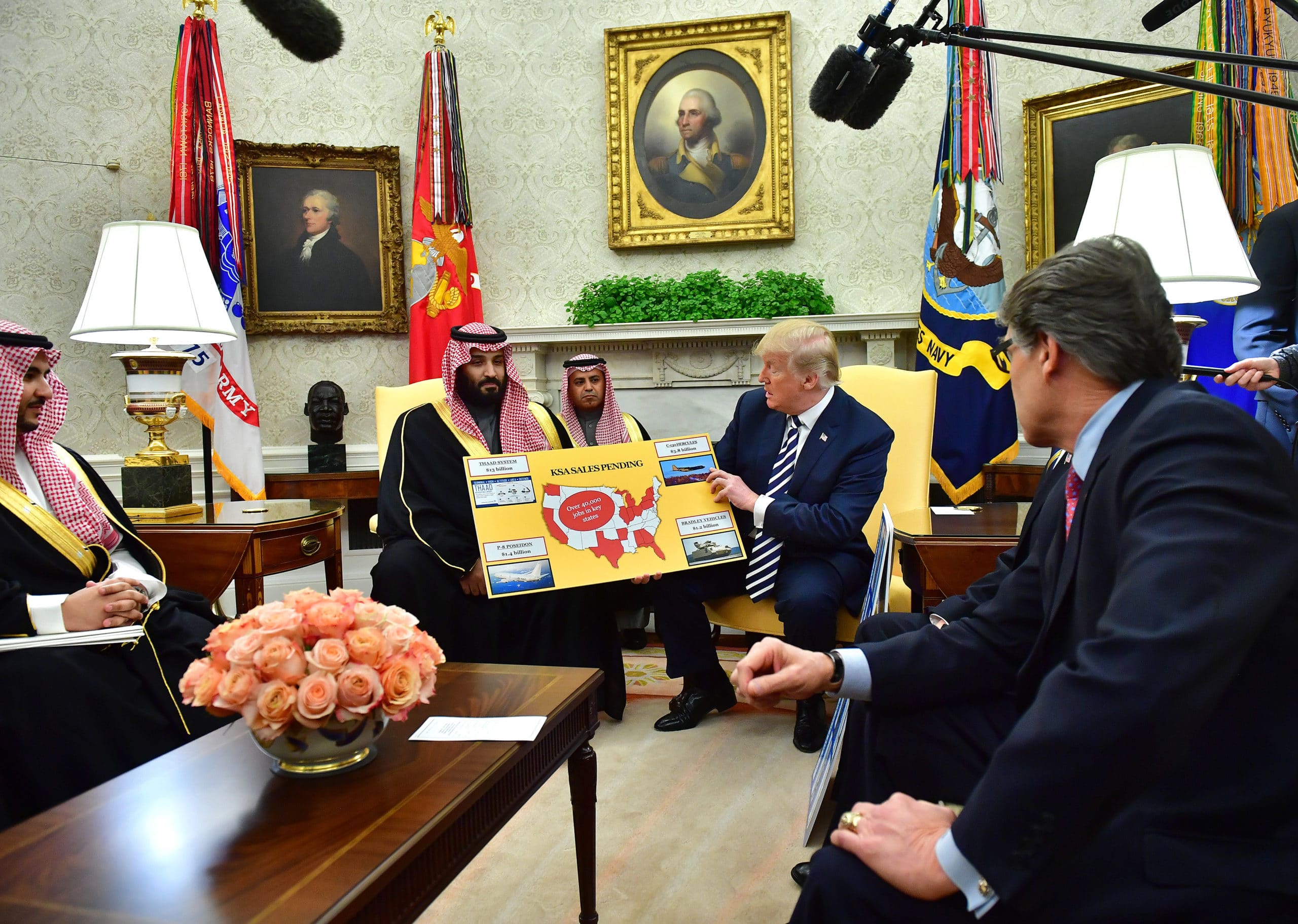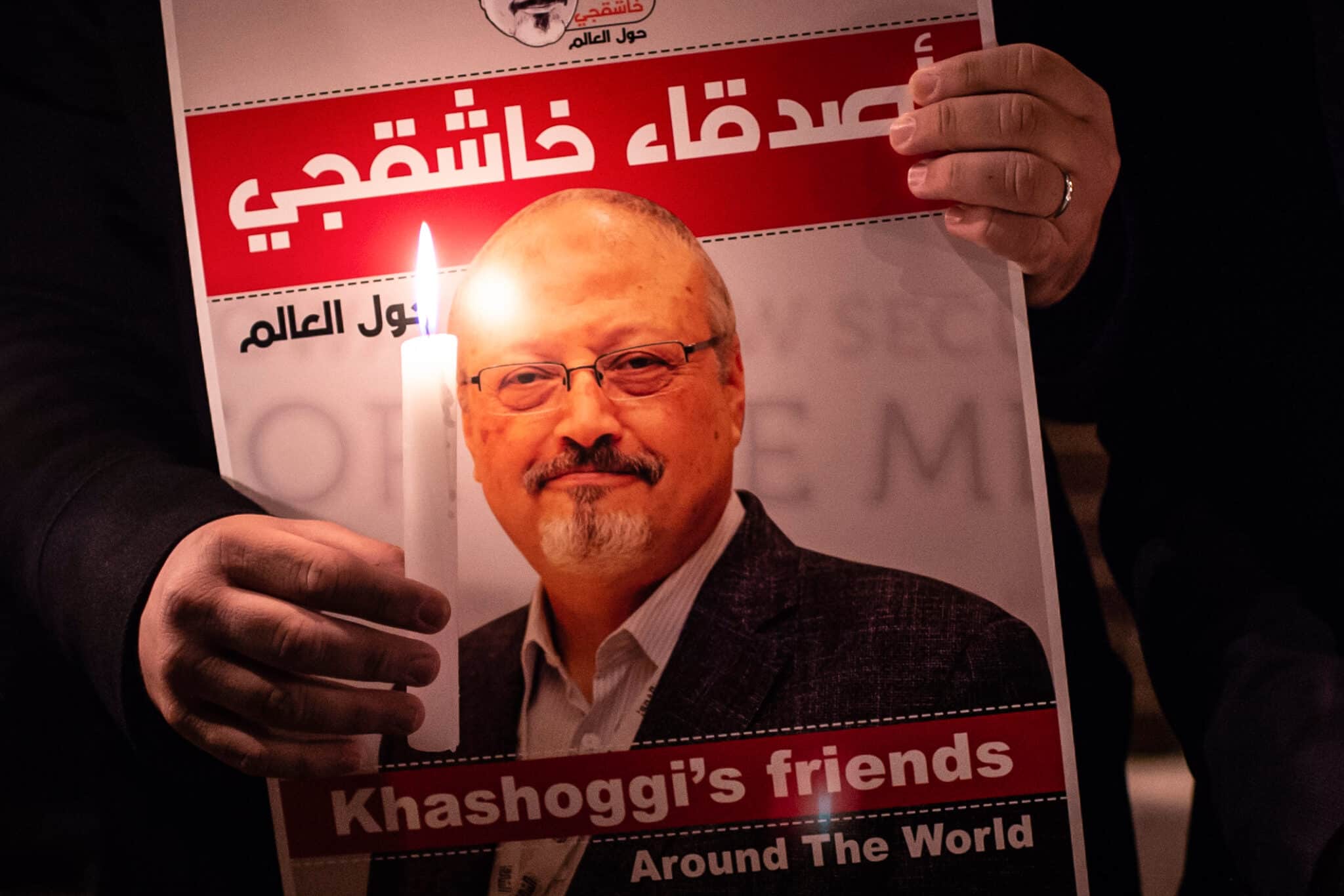January 14, 2021 | From Trump to Biden Monograph
Saudi Arabia
January 14, 2021 | From Trump to Biden Monograph
Saudi Arabia
Current Policy
The Trump administration worked to rebuild ties with Saudi Arabia following their steady decline under President Obama. Investing heavily in a personal relationship with the kingdom’s powerful crown prince, Mohammed bin Salman (MBS), President Trump’s priorities included partnering with the Saudis on a tougher Iran policy, increasing Saudi purchases of U.S. weapons, getting the kingdom to balance global oil prices, and securing Riyadh’s support for improving relations between Israel and the Arab world. While these efforts bore fruit, Trump’s willingness to overlook MBS’ authoritarianism at home and reckless pursuits abroad triggered a bipartisan backlash that threatened to erode support for the U.S.-Saudi relationship.
Trump’s determination to reverse Obama’s outreach to Iran was the cornerstone of the U.S.-Saudi rapprochement. Just before his second visit to the White House, MBS compared Iran to Nazi Germany under Hitler.1 Shortly thereafter, Trump withdrew from the 2015 Iran nuclear deal and re-imposed crippling sanctions on Iran, eventually targeting all its oil exports. The administration coordinated with the Saudis to ensure the oil market remained well-supplied to avoid price spikes.

Crown Prince Mohammed bin Salman and President Trump discuss arms sales during a meeting at the White House on March 20, 2018. (Photo by Mandel Ngan/AFP via Getty Images)
The decision to drive Iran’s oil exports to zero triggered a campaign of Iranian escalation against the United States and its Gulf partners. Iranian-backed attacks included the sabotage of two Saudi tankers, a drone strike on a Saudi pipeline, and, most spectacularly, a drone and cruise missile attack against Saudi Arabia’s massive Abqaiq oil-processing facility. Despite this flurry of Iranian aggression, Trump for most of 2019 opted not to retaliate militarily – despite repeated threats to do so. Instead, the administration primarily responded by sending additional forces to the region, including the first deployment of U.S. troops to Saudi Arabia since 2003.
The importance Trump attached to Saudi Arabia and MBS was evident in an interview he granted to journalist Bob Woodward in January 2020. Trump bragged that he had “saved”2 MBS after the 2018 murder in Istanbul of journalist Jamal Khashoggi, when Congress demanded that the crown prince be held responsible and passed a law to end all support for the Saudi-led war in Yemen – a measure Trump vetoed. Explaining his willingness to indulge MBS’ misdeeds, Trump noted that the Saudis bought billions of dollars’ worth of U.S. weapons and wielded huge influence by virtue of their oil power and leadership role in the Islamic world. In May 2019, Trump controversially issued an emergency authorization that bypassed Congress to sell the Saudis (and the United Arab Emirates and Jordan) $8.1 billion worth of advanced weapons.3
In March 2020, just as the COVID-19 crisis erupted, MBS launched an ill-timed oil-price war with Russia that wreaked havoc on the U.S. shale industry, causing enormous outrage among key members of Congress. After days of negotiations with the Saudis and Russians, Trump helped broker an agreement on production cuts that eventually stabilized the market.4 Trump’s relationship with the Saudis also seemed to pay dividends when the kingdom helped facilitate U.S.-brokered peace treaties between two of its Gulf neighbors, the United Arab Emirates and Bahrain, and Israel. U.S. efforts to resolve a major rift that pitted the Saudis, Emiratis, Egyptians, and Bahrainis against Qatar bore fruit in January 2020, with Riyadh reopening its borders with Qatar and both sides pledging to ease tensions.5
Importantly, during Trump’s presidency, MBS launched many reforms that Washington had long deemed essential for the kingdom’s long-term stability, including introducing taxes, cutting subsidies, reining in the religious police and reactionary clerics, expanding women’s rights, and increasing social freedoms for the kingdom’s huge under-30 demographic. These changes, however, were coupled with a ruthless determination by MBS to consolidate his absolute power and eliminate all challenges to his authority.
Assessment
Trump’s efforts to strengthen U.S.-Saudi relations were generally successful. By going to the kingdom in his first overseas trip as president and investing heavily in MBS’ rise, Trump and his son-in-law and senior aide, Jared Kushner, developed a strong personal link to Saudi Arabia’s two most powerful leaders, King Salman and MBS. That bond was solidified by Trump’s readiness to end Obama’s outreach to the kingdom’s most dangerous regional adversary, Iran.
Confident in U.S. support, the Saudis provided strong diplomatic backing for Trump’s controversial withdrawal from the Iran nuclear deal. Even after Iran began targeting Saudi Arabia, including the near-catastrophic assault on Abqaiq, the Saudis supported Trump’s maximum pressure campaign. Perhaps even more significant, the Saudis quickly welcomed the return of U.S. troops to the kingdom for the first time since 2003.6 They also joined a U.S.-led maritime coalition to protect Gulf shipping from Iranian-backed attacks.7
Reports surfaced that, privately, the Saudis were concerned by Trump’s failure to retaliate militarily against Iran’s aggression in the summer of 2019, especially the attack on Abqaiq. Articles casting doubt about the credibility of U.S. security assurances appeared in the Saudi press. Rumors circulated that the kingdom had reached out to Iran to protect itself.8 Saudi officials publicly denied such speculation, which was largely overtaken in January 2020 after Trump ordered the targeted assassination of Iran’s most important general and the mastermind of its regional aggression, Qassem Soleimani.
Trump could also claim some credit for cajoling the Saudis to help moderate oil prices – both by increasing supplies when Iranian exports were slashed and by cutting production (albeit belatedly) when COVID-19 triggered a collapse in global demand. Similarly, Trump could credibly assert that he helped temper the kingdom’s position on Israel, including minimal Saudi opposition when Trump moved the U.S. Embassy to Jerusalem in 2017, and actual support for Israel’s normalization deal with the two Gulf states – manifested in Riyadh’s immediate granting of overflight rights to airlines from all three countries. In the last days of Trump’s presidency, the administration also achieved a major breakthrough in the long-running spat with Qatar, helping to forge a deal to ease tensions that was unveiled during the Gulf Cooperation Council Summit in January 2021.
Trump’s goal of selling large quantities of weapons to the kingdom and attracting Saudi investment in the United States was realized – though not nearly to the levels that he hyped.

A vigil is held outside the Saudi consulate in Istanbul, protesting the October 2018 murder of journalist Jamal Khashoggi. (Photo by Yasin Akgul/AFP via Getty Images)
The greatest shortcoming of Trump’s policy toward Saudi Arabia was his failure to tether the rebuilding of relations with one of the Middle East’s most influential states to U.S. efforts to curb MBS’ worst excesses both at home and abroad. On the issues of greatest concern to the U.S. Congress – especially Riyadh’s detention and abuse of human rights activists (among them U.S. citizens), murder of Khashoggi, disastrous air war in Yemen, and covert nuclear and missile cooperation with China – Trump seemed content to grant MBS a free pass.9 Trump rejected even the pretense of holding MBS to account or restraining his most counter-productive actions, which both offended U.S. values and threatened U.S. interests. Rather than working to ameliorate congressional animus, Trump’s dismissive attitude exacerbated it, putting the long-term stability of the complicated but crucial U.S.-Saudi relationship on even shakier ground.
Recommendations
- End the “blank check” approach to MBS’ actions, while preserving the U.S.-Saudi strategic relationship. For decades, U.S. support has been the linchpin of Saudi security, providing Washington with enormous leverage over the kingdom. There is no reason for U.S. restraint when an impetuous crown prince takes counter-productive steps that endanger important U.S. interests. But rebalancing relations, not rupturing them, should be the Biden administration’s goal. Even as it pursues tougher diplomacy to restrain MBS’ worst instincts, the administration should keep in mind certain key realities. Saudi Arabia remains perhaps the most influential country in the Arab and Muslim world. Its unequivocal backing for a U.S.-led regional order has been a major asset for American power, as has Saudi support for U.S. strategies to counter Iran, combat terrorism, and balance oil markets. As challenging as it may be to have the Saudis as partners, it would be infinitely worse to have them as an alienated adversary – destabilized, increasingly prone to desperate acts, open to Chinese and Russian patronage, and more vulnerable to the predations of Iran and Islamic extremists.
- Restore normal order to the conduct of U.S.-Saudi relations. Since the relationship’s inception, close personal bonds of trust between American presidents and Saudi monarchs have been the norm. But that personalization was taken to extremes under Trump, with policy regularly conducted via secretive “WhatsApp” communications between Kushner and MBS, consistently marginalizing key elements of the government (including Congress) that have important roles to play in U.S. policy toward the kingdom. The Biden administration should work to re-establish a functioning process of interagency deliberations and congressional consultations, while also seeking to continue a U.S.-Saudi Strategic Dialogue that empowers key agencies to work with Saudi counterparts to advance U.S. objectives across the full spectrum of issues important to American interests.
- Keep the Saudis in the loop on Iran strategy. The Biden administration’s pledge to revive the nuclear deal will not be welcomed in Riyadh. To manage the negative fallout, Biden should ensure that the Saudis, as well as other key U.S. regional partners most threatened by Iran, are regularly consulted and their legitimate concerns accommodated as much as possible.
- Prioritize expanding Arab-Israeli peace. The Saudis played a key behind-the-scenes role in encouraging normalization deals between Israel and several Arab states, setting in motion a strategic realignment that could transform the region’s strategic balance in ways overwhelmingly favorable to U.S. interests. The Biden administration has an historic opportunity to build on this progress with an array of additional Arab and Muslim states, including the Saudis themselves.
- Press for early progress on key human rights cases. MBS has unjustly imprisoned or detained a number of high-profile activists and U.S. dual nationals whose rapid release would significantly improve the prospects for future U.S.-Saudi relations. The Biden administration should make clear that quickly resolving these cases would strengthen its ability to withstand congressional pressure to downgrade the relationship.
- Focus more on ending the Yemen war. The Saudis are increasingly eager for an exit that allows them to secure their border and avoid an IRGC-backed takeover of the Yemeni state. Those objectives align with U.S. interests as well and would be at risk if the Saudis unilaterally left the battlefield. The Biden administration should intensify U.S. diplomacy with the United Nations, Saudis, and other powers to de-escalate the conflict. The United States should be seen as helping a partner reach an acceptable settlement, not as abandoning it on the battlefield. Though frustrating, the United States should also continue efforts to improve Saudi aerial targeting to avoid civilian casualties.10
